Bundesliga season preview II: The surprise teams
In the Bundesliga, things sometimes really get going. Two defeats and you’re at the bottom. Two victories and Europe is an option. Teams like Borussia Mönchengladbach can tell a thing or two about this.
The first part dealt with the fight against relegation. In the second part we will deal with Borussia, FC Augsburg, Werder Bremen, Hertha BSC, Stuttgart and Eintracht Frankfurt. Where are all these teams headed? All of them have the potential for sensations, but they can all slip into the relegation battle very quickly.
The Bundesliga is full of surprises. Let’s see which club will be a positive one.
FC Augsburg
Continue climbing the table
In December 2016 FC Augsburg decided to dismiss coach Dirk Schuster. It was a short pleasure that the club and the ex-Darmstadt coach shared. Instead, a name unknown in many places took over. A teacher who himself did not make it to the professional level, but since then has been striving for a coaching career.
Manuel Baum has been a coach in the FCA’s youth team since 2014. Then came the great opportunity to make his dream come true. But the first six months were rather mixed. Augsburg could only just save themselves.
While the public assumed for the 2017/18 season that Baum’s Augsburgers would be among the safe relegation candidates, the coach always enjoyed complete confidence internally. They stayed calm and let the coach work.
It paid off. It became clear early on that Augsburg would have nothing to do with the relegation. There was rather some upside. In the end, the team and coach were not dissatisfied with 12th place.
If one pays attention to the choice of words of those responsible and players in interviews, however, one will quickly notice a balance of slight self-praise and the striving for more.
The past season has aroused self-confidence that can be beneficial. Except for Marwin Hitz, there was no key player who left the club. Baum can therefore fall back on at least the same quality with which he was already successful last season.
Strategically, a high degree of flexibility is to be expected again. Whether three, four or five at the back – Baum always made his decision at short notice. He changed the basic formations, but also the amount of pressing and the way of starting. The 38-year-old attaches great importance to organised work against the ball, paying meticulous attention to the details.
He also spends a lot of time studying his opponents. Where could there be gaps? How can the strengths of your own players be used to play on your opponent’s weaknesses? Manuel Baum has many thoughts.
In just one year, the public’s opinion has therefore changed dramatically. Augsburg is no longer one of the relegation candidates. But that is also where the danger lies. After a successful year, there is always the threat of stagnation. Even if the players have shown their awareness in the interviews, they still have to bring it to the pitch.
FC Augsburg are striving for more, but must not forget the basics: Staying in the league.
Our prediction: Augsburg will play as solid a season as last year, even improve a little: 11th place.
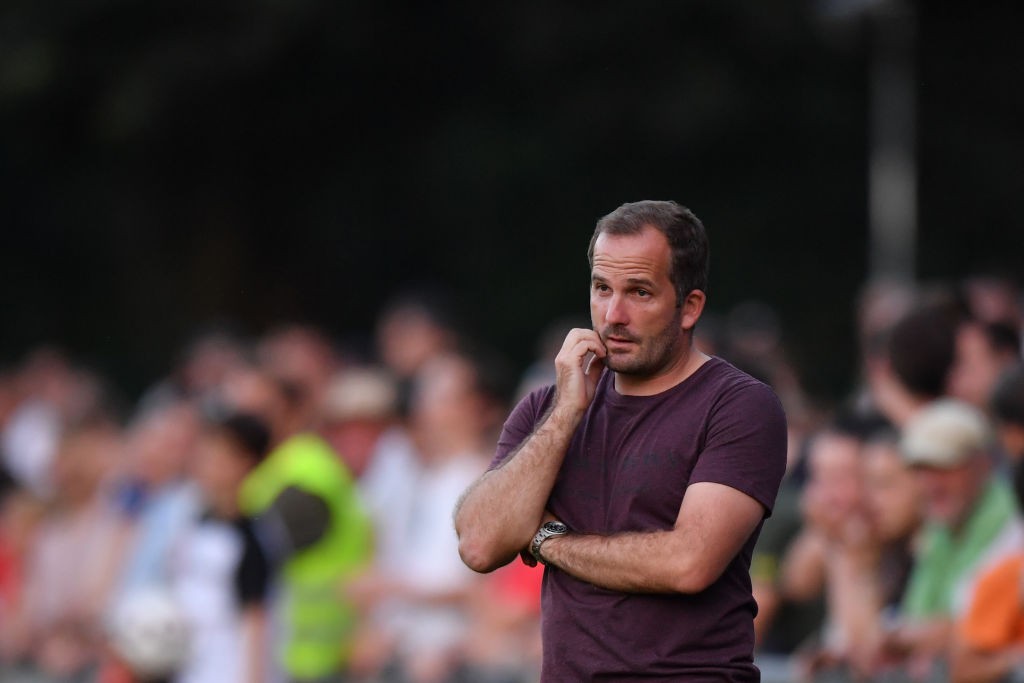
(Image: Sebastian Widmann / Getty Images)
Expert Interview
To get an even better assessment, we invited Felix.
Last year FCA was considered the relegation candidate par excellence. An outstanding first half of the season and a less good second half followed. What does that do with your expectations for the new season?
Absolutely. The season’s target in Augsburg is always staying in the league. Should it become apparent that this will be achieved at a time when the goals are being revised upwards, then the sporting management is certainly self-confident enough to articulate this, e.g. single-digit ranking. The outstanding first round of last season had much to do with consistency, which in turn went hand in hand with an almost injury-free squad. If Alfred Finnbogason is missing over a longer period of time, as in the second half of the season, the offensive statics and efficiency will change considerably. But that’s why Julian Schieber was hired. One can only hope that both injury-prone centre forwarders will not be absent at the same time.
How satisfied are you with the transfer phase of your club and who could present himself in the preparation so far particularly positively?
The new arrivals are a good mix of experience and potential. Julian Schieber and André Hahn were hired for experience, both players who would not be available to FC Augsburg if their careers had been optimal, but who represent a low risk. The young midfielder Frederik Jensen, a Finnish international after all, and double derby winner Felix Götze from the Bayern amateurs got the potential. Felix Götze is probably directly in an open fight with Raphael Framberger for the regular position as a right-back. So far, FC Augsburg have not had to give up any top players except Marwin Hitz, despite all the rumours Philipp Max, Michael Gregoritsch and Alfred Finnbogason seem to continue to play in Augsburg. Nevertheless, the squad is still a bit bloated, as many loan players have returned and have not yet been loaned or transferred again despite a lack of perspective. After all, we were able to sell Moritz Leitner. Compared to the Augsburg possibilities I am satisfied with the summer transfers.
It’s hard to tell if there is a clear winner in the preparation, but one loser is Caiuby, who was an important performer last year. But if you extend your holiday unauthorized by one week and miss the first training camp, it’s your own fault. At least he appears with a clean head after his return and works hard to find the connection again.
What will the playing system look like and where must the team improve compared to last season?
FC Augsburg will continue to operate from a compact defensive and want to attack their opponents with a quick and rehearsed transition game. Improvements are needed above all in consistency and in games, in which the opponent leaves the initiative to the FCA, which happens more and more often, especially at home games. However, I regard this as a compliment and an indication that FCA has established itself in the Bundesliga. Moreover, a higher efficiency in front of the opponent’s goal could not hurt.
Where does FCA finish in the standings at the end of the season and will FC Bayern be champions again?
FC Augsburg will again find at least three other teams behind them. I think a position in the table in the 10 to 14 range is realistic. Let’s say it’s back to 12th place like last season. That is also the keyword, the FC Bayern will – yawn – become champion again, like in the last years.
Werder Bremen
Back to the old days
All hell is breaking loose at the airport in Bremen. Hundreds of Werder fans are frantic about a man who just came out of the gate in a purple suit. This man is called Claudio Pizarro – triple winner with Bayern, multiple German champion, currently still the most successful Bundesliga goal scorer from abroad.
Only a few players who have played for two such different clubs as Werder Bremen and Bayern München several times enjoy such a status in both fan camps.
These scenarios took place in 2015. Three years later – this summer – Pizarro comes to the Weser for the fifth time. This time there are rather divided opinions about the transfer. After all, the striker turns 40 in October.
But it will remain the only transfer that is controversially discussed by the fans in the summer. Pizarro will use his experience to help a young team that has developed considerably in recent months. Nobody in the club expects miracles from him.
Last season, coach Kohfeldt managed to form a unit from a headless team that often had to brace itself against relegation. Heart, passion, but also tactical-strategic ideas were behind the sudden success.
Werder has made great strides in the structure of the game and in the many phases of possession of the ball. This was also due to Delaney, who now moved to Borussia Dortmund. Max Kruse was and is without question the key player in the offensive. The striker is usually somewhat under the radar in such questions, but is one of the best offensive players in the league.
Thanks to his intelligent space usage, he offers his team more variability and safety in the final third. His runs are almost always accompanied by great added value.
Klaassen, who came from FC Everton for 13.5 million euros, is to fill the gap left by Delaney. Looking at his potential, this addition makes an incredible amount of sense. In general, it seems as if Werder finally has an idea of what the future should look like.
Kohfeldt got players who fit his game plan. Additons such as Harnik or Pizarro support him not only from a football perspective, but above all with their experience. This will make it easier for the coach to introduce young players to the first team.
But Werder is more than good players. Kohfeldt gave the Bremen team a unity that made them an unpleasant opponent.
The balance fits at the Weser. If the club continues this development continuously and with much patience, then one perhaps comes a few steps closer to the old, successful days again. But this path is still long and so Kohfeldt will first have to make sure to confirm last year’s performance and then possibly step up a gear. In any case, Bremen can be expected to do a lot.
Our prediction: Werder will play a sovereign season, hope for Europe for a long time, but will be satisfied with rank 8 in the end.
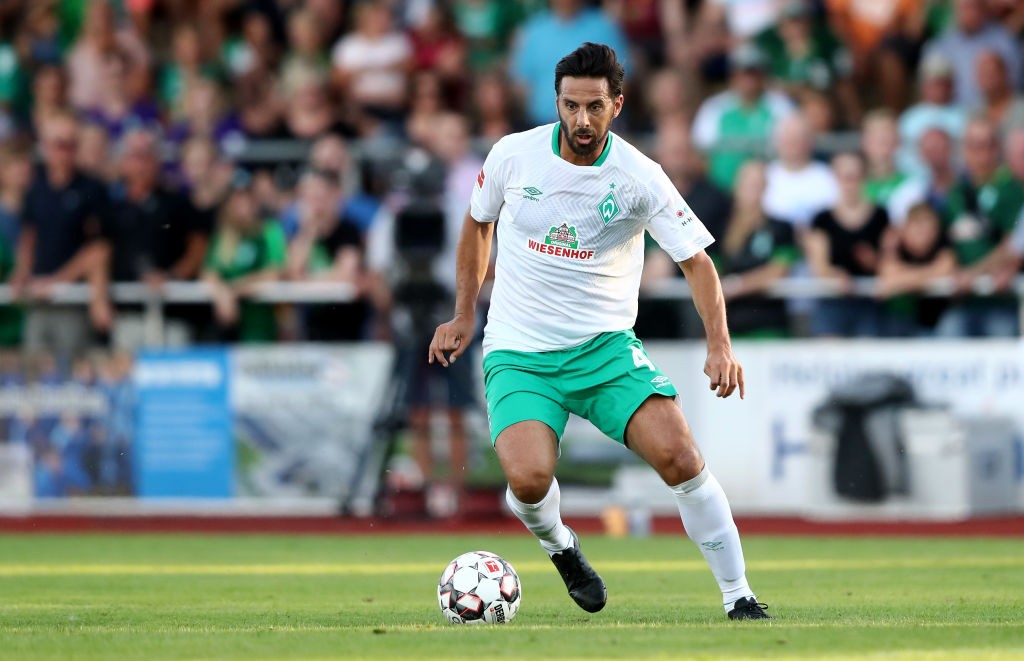
(Image: Christof Koepsel / Getty Images)
Expert Interview
We can almost call him our Miasanrot expert for Werder Bremen: Joey gives us insights into his thoughts.
Werder Bremen has performed well in recent months. Would you agree with this thesis?
Definitively. Although I’m a little ambivalent: The progress under Kohfeldt was clearly visible, that is out of the question for me. The set-up was more structured, we were more flexible tactically and overall the focus was much more on ball possession phases and their design. At the same time, we remained heavily dependent on individual players in many of these areas. The build-up without Moisander, for example, was still only average and without Kruse there was a lack of verticality in the final third.
Where else is there a need for optimization and what has to happen so that the next steps can be taken?
The goal must be to continue the positive playful and tactical development and to become more independent of individual actors. In the final third Kohfeldt was also clearly lacking in penetrating power and, especially when Kruse was covered, also in constructiveness in passing. In terms of development, we were and are heavily dependent on Moisander, while there is a lack of strategic class in midfield. However, thanks to intensive preparation and personnel improvements, we should be able to make progress there.
How satisfied are you with these personnel improvements and what are your expectations for the season?
I am satisfied overall and this is an absolute rarity. For a long time, the club’s transfer activities were not as well thought-out, clearly structured and geared towards a game philosophy as they were this summer. On the offensive, many of the half-space players desired by Kohfeldt were able to commit themselves to a broader and more suitable playing style, while at the same time ensuring flexibility to make adjustments. Klaassen has also been a very promising replacement for Delaney, which will certainly help us offensively. His timing for offensive advances is, like his finish, even better than Delaney’s and he’s more creative when playing with the ball. This should help us to continue our positive playful development. I am dissatisfied with the fact that we, as things stand now, have neither signed a competitor for Bargfrede (preferably with strengths in the build-up), nor a central defender with strengths in the build-up game. So I see the danger that we will continue to be heavily dependent on Moisander.
Where will Werder finish at the end of the season and who will become champion?
I expect Werder to be placed in the upper half of the table. The precise position will be decided very narrowly in the end. But I will just lean out of the window and say: We will be in 6th place, the championship question could be just as exciting this season. The BVB has sensibly strengthened themselves, were able to hire an excellent coach in Favre and the mood seems to be better again. However, the lack of quality in the central attack could be their downfall. In view of the squad, Bayern should actually become champion, but I’m going to lean out of the window again and say: Dortmund does it.
The next page will be about Hertha and Gladbach.
Hertha BSC and Borussia Mönchengladbach are currently not taking the next step. However, they are both trying to sell the apparent stagnation positively. Can they move into the upper third this season?
Hertha BSC
A grey day in November
We’re going back to 2015, this time in Berlin. End of November. A freezing cold wind blows through the streets of the capital. The snow makes it bearable at least for those who are already big fans of this season. On Sunday afternoon TSG Hoffenheim will be a guest at the Olympic Stadium.
The Berlin Eisbären (hockey) play almost simultaneously in the Mercedes-Benz Arena. After all, Alba Berlin (basketball), the Füchse (handball) and the BR Volleys (volleyball) had already played their games of the week. Nevertheless, only 37,000 spectators make their way to the Olympic Stadium in the evening.
The cold wind blows through the marathon goal, the game also does not help to warm people up. In the end Hertha wins 1-0, but with only one goal shot at the opponent’s goal – and that comes from Polanski, a player of TSG Hoffenheim. Dárdai, who is currently contesting his first season as Hertha coach, nevertheless makes a satisfied impression.
In 2018, Berlin’ s style of play will remain somewhat peculiar. Dárdai is still on the sidelines, but his team still scores relatively few goals on average, but they also concede relatively few. The results prove him right up to here. But they want more in Berlin.
Dárdai has been busy curbing this euphoria since 2015. “We’ve been playing a similar football for three years because we’ve had almost the same team for three years. That’s why people can’t expect much change. For a player’s development club like us, it’s great if we finish seventh, sixth or tenth,” he told the Kicker.
He certainly has a point, but the club’s ambitions are greater than tenth place. As the capital, one would like to regularly take part in the international competition in the national sport of football. Places seven, six and ten are clear progress on everything that happened before Dárdai. After all, he has established Hertha in the upper half of the table.
For the next step, however, not only are new players missing, but also tactical means to implement the given strategy on the pitch. In possession of the ball, under Dárdai the Berlin team always seemed sluggish and static. There was a lack of solutions on how to get into the final third via short passing.
A coach can “only” work with what he is given. But he can also give players alternatives, find tactical tricks to mask their own weaknesses and give his team an advantage against stronger teams. He was not as successful in the past season as he was in the first two years.
This is why there is a threat of stagnation in Berlin. The trainer’s rating will also depend on where the Old Lady will finish in the standings this season. When Hertha meets TSG again on November 24 this year – exactly three years and two days after the Winter Kick against Hoffenheim – the number of spectators should not be expected to increase significantly. Especially not when it’s going to be another grey and cold day.
Following the hard core, which always find their way to the Olympic Stadium, many Berliners feel better entertained elsewhere. Hertha rarely offers spectacle. Dárdai and the fans wouldn’t care if Hertha won 1-0, as they did then. The 42-year-old only has to do without goal scorer Polanski this time.
Our prediction: Hertha remains the grey mouse of the league, must be content with place 10 again.
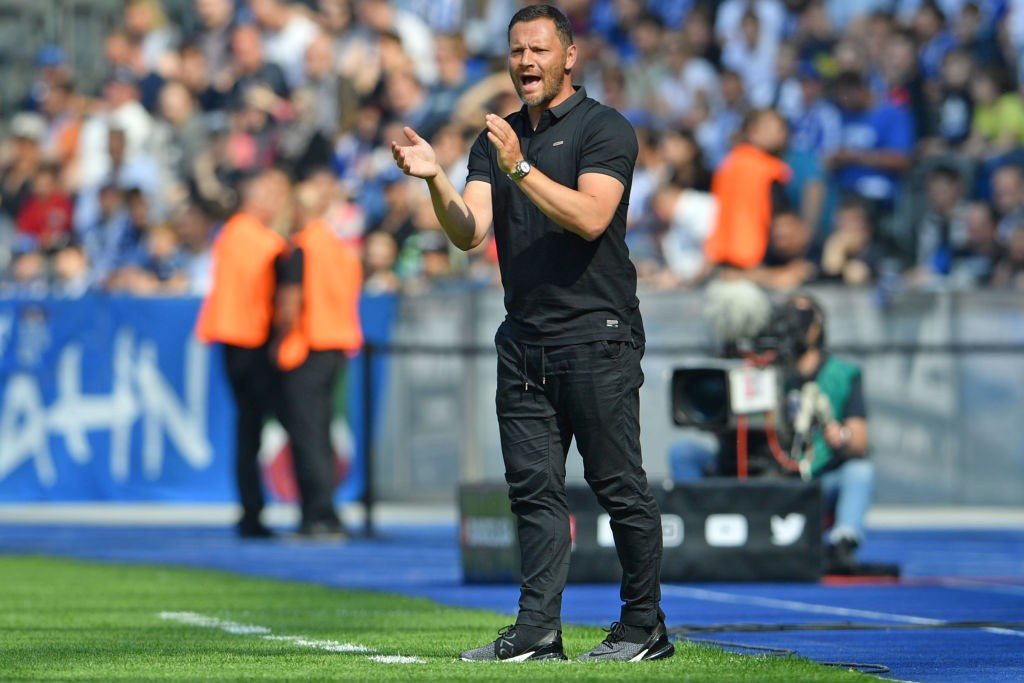
(Image: Thomas Starke / Bongarts / Getty Images)
Expert Interview
Marc Schwitzky from Hertha BASE 1892 will explain in detail what he expects from his old lady this year.
Hertha was often referred to as a gray mouse in the past. 10th place last season fits the picture. Is the glass half full or half empty – how satisfied is Berlin?
Not a simple question, because satisfaction will depend massively on the coming season. If you manage to develop tactically and with the ball, then the past season was the necessary run-up.
Pál Dárdai has often remarked that the last season was mainly for involving young players. Arne Maier (19), Maxi Mittelstädt (21), Jordan Torunarigha (20) and Palko Dárdai (19) have all taken a step forward. Niklas Stark (23) has been promoted to head of defence and the new players Davie Selke (23) and Valentino Lazaro (22) still belong to the young group. So last season a lot of fruit was planted and now the harvest has to take place. If it should become such a grey season again, then one speaks in Berlin of stagnation and unfortunately must question also the work of Dárdai somewhat, because the desired future can be made possible only by strong present-day work.
A further prejudice is the discrepancy between reality and objectives. Which goals does Hertha pursue in the short and long term and how do you assess them in terms of achievability?
This is no longer the case in Berlin, actually since Pál Dárdai took office. With him, a clear realism has returned to the club, even if the vision of the future of those responsible for the club is of course ambitious.
Clear goals were not formulated in public. However, it can be assumed that Hertha will continue to be one of the Bundesliga teams playing for Europe in the coming years. With a much less talented squad, one has already qualified twice, so talk of “establishing oneself” or “not wanting to slide down” would actually no longer be credible. The squad is also too ambitious for this. In order to reach the desired table regions, however, a further playful development must take place.
In the long term, Dárdai wants to have an Ajax-like squad structure in which many of its own players will find their place and grow into strong Bundesliga players. If you look at the talents already mentioned as well as the class of 1999, which won the A-Youth Championship, you are on a very good way. Also this year very promising youngsters like Muhammed Kiprit and Dennis Jastrzembski slipped into the professional squad.
Under Dárdai Hertha often tended to static ball possession play. Where do you see the greatest need for action from a strategic point of view and where does the team need to improve in order to achieve the goals?
Right, this is the big construction site. Last season you could often shine with counterattacks or standard situations, there was not much to get out of the possession of the ball. A big factor is the central defensive midfield. Fabian Lustenberger and Per Skjelbred often played together, in the meantime the term “double six of death” invented by us is quite popular, because these two fighters kill not only the opponent’s build-up game, but also our own. Arne Maier added an unexpected weapon in the possession game, but a 19-year-old cannot shoulder it constantly on his own. Personnel reinforcement is therefore needed for the centre. Much could depend on playmaker Ondrej Duda, who has been Hertha’s problem child for the past two years, but is currently undergoing a great deal of preparation and could perhaps become a source of hope.
In the coming season Hertha wants to play for the first time with a back three, which could also help to be less predictable. Stark, Torunarigha and Rekik are strong centre-back players who could play their part in building up the game. So hopes are in the transfer market, Duda and new tactics.
Where will Hertha be at the end of the season and who will be champion?
Since some direct competitors of Hertha (Gladbach, Bremen, Stuttgart) have strengthened remarkably well, I believe that it will be difficult this year with place 7 and upwards. However, if you develop yourself playfully and continue to develop your talents in this way, then all Berliners can live well in eighth to ninth place.
It’s very boring to bet FC Bayern as champions. But I think that Niko Kovač will take this competition very seriously and Borussia Dortmund will have to get used to Favre football. Otherwise I see no club in a position to really attack – at best RB Leipzig. My bet is: FC Bayern München.
Borussia Mönchengladbach
You don’t always have to be sexy
“Berlin is poor, but sexy!” – with this slogan the former mayor of Berlin Klaus Wowereit made for laughter and a good transition from Berlin to Borussia Mönchengladbach in our preview. Max Eberl, sporting director of Borussia, formed a competitive team with relatively few means.
Since the 2011/12 season, the Gladbach team always reached at least 9th place, and after the successful time under Lucien Favre, there was even hope that regular participation in the European Cup would be possible. But in Gladbach, normality returned.
Similar to Hertha BSC, the team from the Lower Rhine region became a grey mouse in the Bundesliga. Two ninth places in a row are perfectly okay, but not a big success either. Dieter Hecking was even a trainer who fits this assessment like no other.
Hecking stands for gray mouse football, if you will. He rarely adapts the basic formation of his team, and there are even fewer moments of surprise. Midfield pressing, wing-heavy attacking play, individual class of players – the tactical means of the former cup winner are quickly explained.
But Hecking also stands for stability and consistency. His teams seldom slipped deeply. The question for the coming season will nevertheless be whether, after two stable years, steps can finally be taken forward again. Hecking also has to stretch and change.
“Normality is not sexy,” Max Eberl knows. But he also asks for understanding that it would take time to repair the construction sites. The sporting director takes the pressure off the coach and the team. There is no reason not to do so.
But if you read between the lines, he expects progress during the season. ON the pitch and in the table. Eberl’s ambitions are great, the squad is of high quality. His Borussia doesn’t always have to be sexy, but after two years without a European Cup, the hunger for international business is huge.
Our prediction: Hecking will not make the next step with Gladbach. Borussia lands in 9th place for the third time in a row.
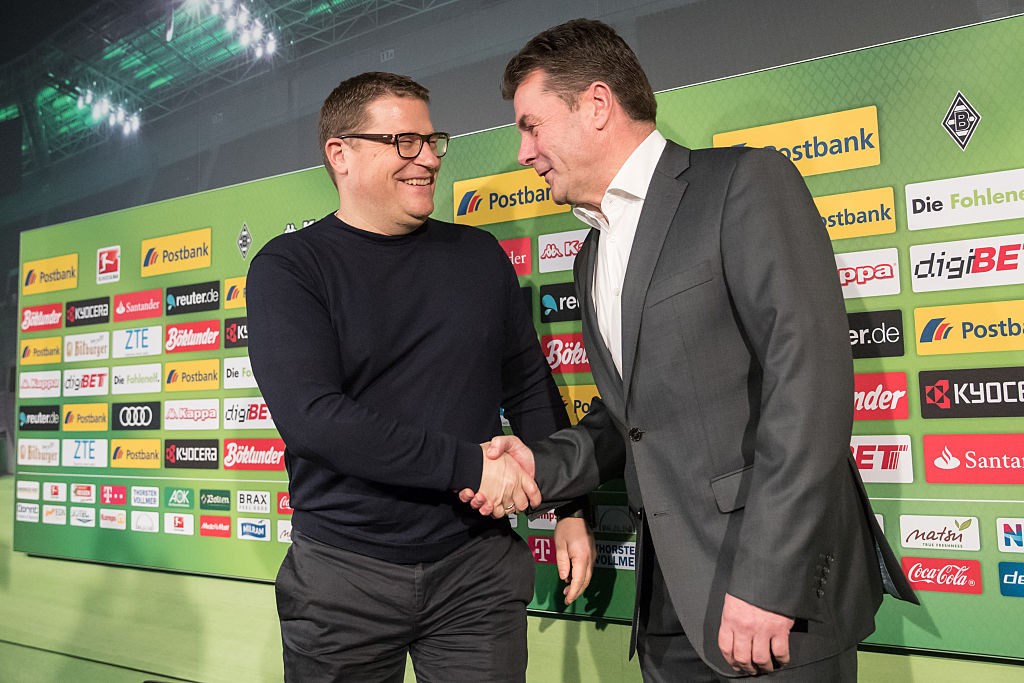
(Image: Maja Hitij / Bongarts / Getty Images)
Expert Interview
For more expertise on Borussia Mönchengladbach we asked Gisela Schneider – better known as Teilzeitborussin.
Eberl and Gladbach have a healthy and realistic self-assessment. Accordingly, the 9th place last season was neither exuberant nor sad. What are your expectations for the Borussia this season?
?
My expectations are actually the same as last year and in the years before: A place higher than 5 should not be realistic, but neither should one below 9. Apart from the ranking, however, I mainly hope to finally see some beautiful football from my team. That’s the most important thing to me besides keeping the league.
Now the squad was only cautiously supplemented and not completely mixed up, which gives me hope that the team will quickly be well-rehearsed. If the bad luck now leaves us alone (a torn ligament and a torn muscle fibre in the preparation were already again a mood killer), it could even work out with both goals – the place in the standings and the football worth seeing.
How satisfied are you with the current squad and do you still see a need for action?
I am very satisfied with the defense. Only Jannik Vestergaard left us there, while we added a young left- and an experienced right-back. I’m just as happy in midfield. We were already well staffed there last season and with the long-term injured and two strong looking young newcomers we now have a lot of flexibility in terms of names and player types in the centre. But I’m still a little at a loss with this attack. On the one hand there are a few transfer question marks, let’s see who will actually be on the pitch at the beginning of the season.
And I don’t really know what I have to expect from Pléa. The concept of a centre forward is not exactly a success story at Borussia and I personally don’t like this system very much either. Well, maybe I’m judgmental about that, too. Let’s see how this develops – it can also be very successful.
In the long term, they definitely want to be back in the European Cup. In 2012 (4th place), 2014 (6th place), 2015 (3rd place) and 2016 (4th place) Borussia was at its maximum performance. What is currently still missing to get back there?
Unpredictability, my very clear answer. Both in the system and for each individual player. Last season (and often in previous years) I saw the same game almost every week – with an opponent who knew exactly what to do to block our players and undermine our match plan. I wish that not every coach knows weeks in advance how to prepare his team against us and that we can upset an opponent with a change instead of applying the same recipe again and again.
Fortunately, the test games and various statements in the summer interviews allow the conclusion that coaches and players see it the same way and work on it.
Which place will Gladbach finish at the end of the season and who will become champion?
It’s almost a tradition that our ranking doesn’t depend on us, but on what our competitors do. So I look up and guess that at least three of the clubs that landed in front of us last season won’t be able to do it again. If you look at the clubs that were behind us, we should be in 6-7th place.
And of course, Bayern will be the champions. I think your season could be very bumpy, but I just don’t see any competition far and wide that isn’t busy with their own little problems. Except maybe Schalke. But that prediction is too bold for me.
On the last page we look at the cup winner Frankfurt and Stuttgart.
Eintracht Frankfurt
Where is the stability?
In the Supercup and in the preseason Eintracht Frankfurt did not show a good face yet. The departure of key players is too serious, the squad has not been able to implement the demands of coach Adi Hütter enough so far.
It became evident, not least at the Supercup against Bayern, that Frankfurt are far from having the necessary level to return to the top half of the table. The game phases in which they aggressively push forward are too unclean. They also have problems in deep defense. With the ball, as became clear on Sunday, there is a lack of creativity to create opportunities. At the moment there are nuances missing everywhere.
It was often only dangerous for Bayern when a standard or a cross sailed into the penalty area. But Frankfurt believes in its course. Many young players found their way to the Main during the summer break. Willing to learn, dynamic, fast – Hütter needs such attributes for his ideas.
However, the coach has to consider whether to put them on hold first and only carry them gradually to the team. During the preparation, Eintracht often seemed overwhelmed. Also the fitness seemed to be not yet sufficiently available, in order to convert the planned football over a longer distance.
Nine goals were conceded in seven test matches, five more against Bayern. Without a certain fundamental stability, the start in the Bundesliga will not succeed. The past has shown that teams with strong defensive work can be very successful.
“It was almost embarrassing in the second half. Or rather: unpleasant. Bayern was superior in all respects,” said Hütter after the Supercup match. But his gaze must now – similar to his game plan – move forward. In Frankfurt, he is given the time he needs to cope with the setbacks in terms of personnel and to implement his ideas. If this takes too long, however, there is the threat of a difficult season.
Our prediction: Frankfurt will start the season badly, but will catch up in time. In the end, 12th place.
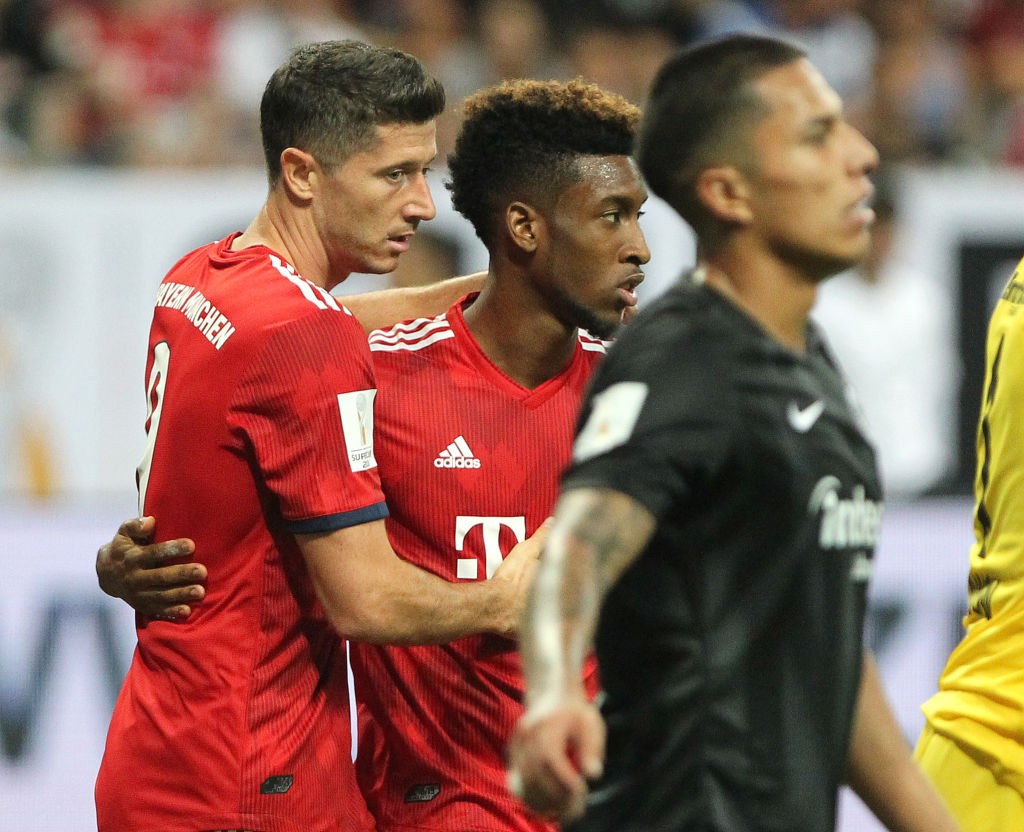
(Image: Daniel Roland / AFP / Getty Images)
Expert Interview
Marvin from Eintracht-Podcast looks into the new season as skeptical as we do.
In addition to a quite respectable Bundesliga season, the cup victory stands out. How optimistic are you that the SBU can still at least maintain its level after the many departures?
So far I am rather sceptical. The new recruitments are all interesting, but once again surprise bags. Given the triple burden and the absence of a leader like Boateng, it seems more than unrealistic to repeat the previous season. But: Hübner and Bobic have already proven in previous years that they sometimes bag important transfers just before the start of the season. So we can be curious if anything will happen.
What kind of football does Adi Hütter stand for? Or in other words: what do you expect from the new coach from a strategic point of view?
Hütter stands for offensive high speed football. The most important thing for him is that players are fast and therefore fit optimally into the system, which is why the former top talent Stendera has no future with Eintracht.
What is the club’s long-term goal? Where must Eintracht Frankfurt develop in the coming years?
One of the goals is to remain in the Bundesliga for the long term – with occasional participation in the Europa League. Swinging between 8 and 12, with outliers upwards, if the season permits. On the other hand, however, the long-term goal must be to get a rhythm into the training and development of one’s own stars. Similar to Freiburg perhaps. Currently we act with many loans, which can run extremely well, however, provides larger fluctuations and leaves us without a transfer fee in the worst and extreme case.
Where will Frankfurt land at the end of the season and who will be champion?
After a rousing European League season and many great moments, however also start-up difficulties with the new coach – especially in the league, we land in the Bundesliga on place 12. FC Bayern becomes champion again. With a Kovač that surprises many critics. Again
VfB Stuttgart
Twitter reactions
The social network Twitter has one big advantage: no matter where in the world something happens, it happens extremely quickly. The speed at which messages are chirped around the world is sometimes impressive.
But Twitter also has one big disadvantage: users can be provoked to a premature opinion at the same speed, which they then send off quickly.
People who had a Twitter timeline full of Stuttgart fans during the 2017/18 season may have enjoyed themselves. Michael Reschke’s appointment in summer 2017 was not treated as happily as one might have expected as a fan of Bayern. Reschke had made a name for himself.
However, his first transfers were less promising. After older players who had long since passed their prime came to VfB, the hashtag “Reschkerampe” made the rounds on Twitter. A year later, this negative mood has changed.
Pablo Maffeo (Manchester City U23), Nicólas González (Argentinos), Borna Sosa (Dinamo Zagreb), Roberto Massimo (Arminia Bielefeld U19), Marc Oliver Kempf (SC Freiburg), David Kopacz (Borussia Dortmund U19) – Reschke has let his network play this summer and is looking for talents all over the world to strengthen the VfB.
But that’s not all. With Gonzalo Castro and Daniel Didavi, quality came to Stuttgart – with experience.
As is the case if you mainly hire young players, it will depend on how quickly the talents can develop at Bundesliga level. But some of the names are very promising.
If it weren’t for Tayfun Korkut, who has been certified as a surefire relegation candidate on Twitter before coaching a single game. This time even from many people who are anything but VfB fans.
But – how could it be otherwise? – Korkut surprised. The coach earned 31 points from the 14 remaining matches. Only FC Bayern gained three more points in the same period.
It cannot be taken for granted that everything will remain this way. However, the VfB Stuttgart has a lot to be trusted. From a collapse to the international qualification the club has been waiting for for so long, everything is possible.
If you look around on Twitter these days, few suspiciously talk about VfB when it comes to the coveted places in the top third. If Twitter lives up to its reputation as a barometer again, there may be a big surprise.
Our prediction: VfB Stuttgart is the surprise. 6th place!
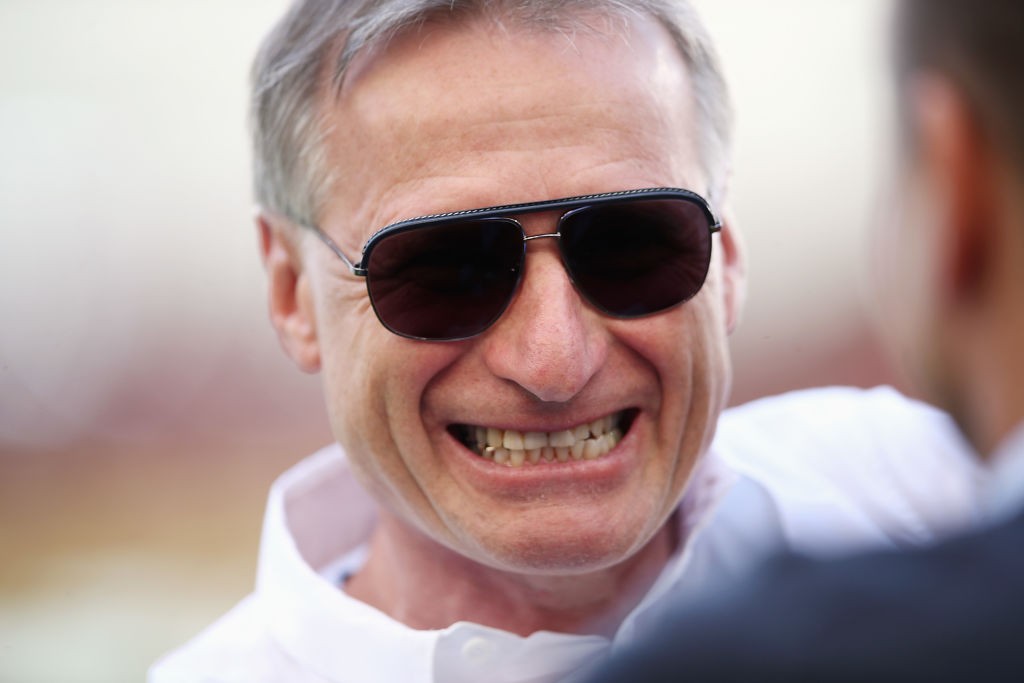
(Image: Alex Grimm / Bongarts / Getty Images)
Expert Interview
Lennart Sauerwald writes for Rund um den Brustring and gives us insights into his emotional world before the new season.
At the beginning of Reschke’s time there was a lot of headwind. How do you see him today and why?
I don’t always get along with his kind, but as far as his work is concerned, I am currently confident. The headwind Reschke had to endure last summer has several reasons: His predecessor was popular and appreciated in Stuttgart and his dismissal is still incomprehensible to most. Reschke had only little time until the end of the transfer window and signed not only Santiago Ascacíbar but also Dennis Aogo and former VfB player Andreas Beck. Transfers that did not necessarily match his reputation as a “pearl diver”. In addition, it became clear that he had not previously been in the public eye, which led to unfortunate and inappropriate statements on his part. In winter he scored a big hit with Thommy and during the summer break he added a lot of early, interesting transfers. What they have to offer, we will see, Nicolás González inspires me most. In any case, he has managed to create competition in almost every position. The season is a test for him, too.
The VfB has a great past, but also some downswings behind it. What are the club’s short-term and long-term goals?
When you ask the president, in two to three years’ time we’ll play either in the Champions League or “there are only two clubs bigger than us in Germany: one in the West, one in the South”. That’s what he said shortly after promotion in 2017. If the separation of the professional team, which took place shortly thereafter, is to bear fruit in the long term, this is also almost without alternative, because only in the Champions League do you earn sums with which you can permanently finance the squad strengthened by the one-off Daimler financial injection (of 41.5 million euros). This season, however, are all modest for the time being and prefer not to set a season goal at all. Actually, for a promoted team in the second year staying in the league is still the motto, I assume that we will be in a secure midfield somewhere in good time.
Do you see no chance to somehow slip into international business? What is missing to close the gap to the top?
No. 7th place last season was an exceptional situation, in which the team after the repeated coaching changes in the last years pulled itself out of the swamp and at the end of a surreal run even ran over a completely unmotivated Bayern team in their stadium (had to be, but probably also means more to us than to you). This run is now over and Korkut must find new answers to the worst goal scoring in VfB’s Bundesliga history. The defence was finally in the Bundesliga format again last year and is not really worse even at a Pavard exit. If we can do better in attack again, I can imagine that we will qualify for the UEFA Cup once again. The Champions League is unrealistic in my view, except for one outlier season.
Where does the VfB land and who becomes champion?
VfB lands in 9th place, FC Bayern is 80% likely to win the championship, the remaining 20 percent is a stroke of genius by Lucien Favre.
Preliminary conclusion
In principle, it is impossible to place these midfield teams safely in a specific region of the table. It may well be that Frankfurt is suddenly back on top and VfB and its young team are paying a lesson. The nice thing about midfield is that nuances, that few games can decide whether the season will be a sensation or a catastrophe in the end. Bundesliga, Bloody hell!



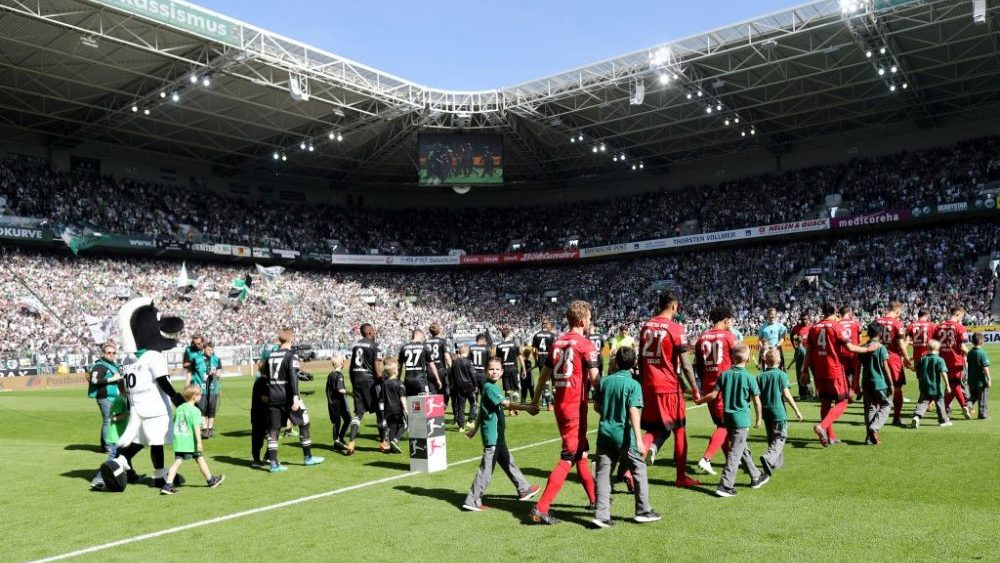
 August 16, 2018
August 16, 2018 


